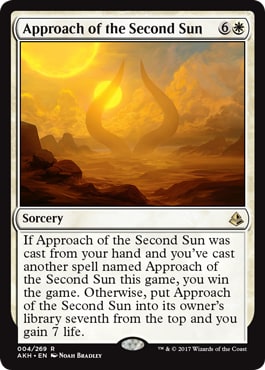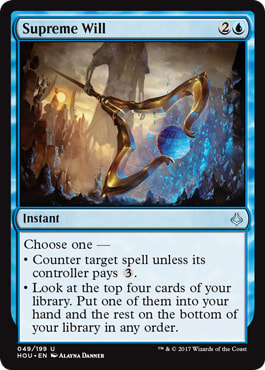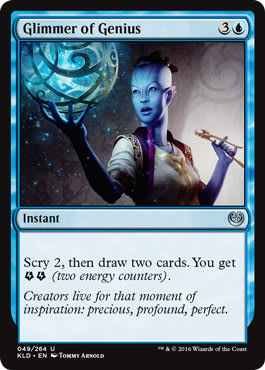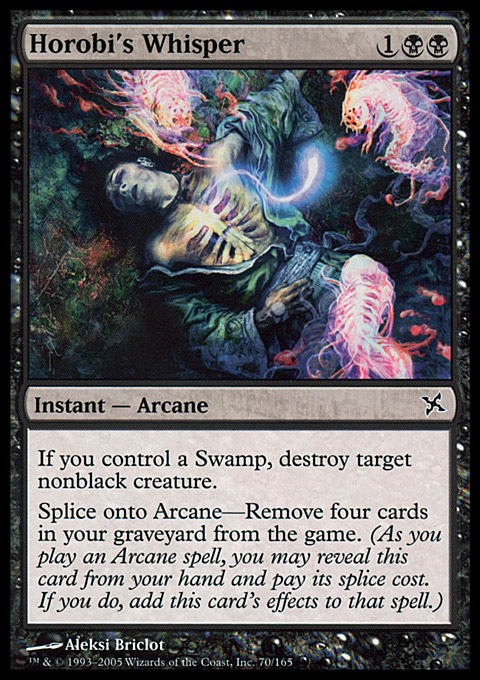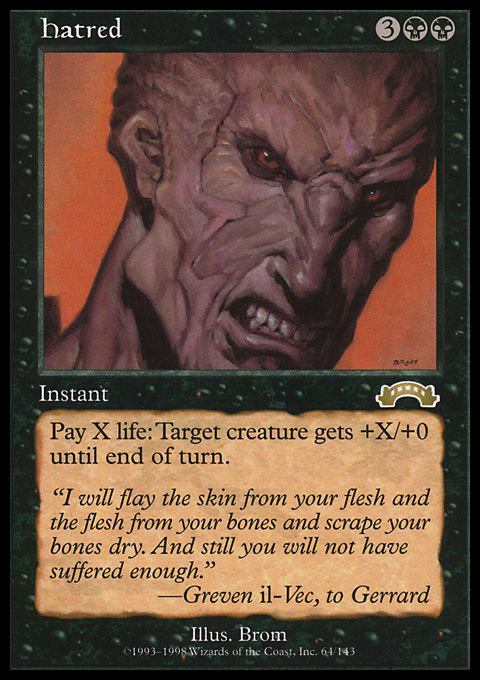The Night I Learned About Good Bets
About thirteen lucky years ago, I got invited to Jon Finkel's birthday dinner.
After a few years of not hanging out at all (he had fallen away from Magic and fallen off the Pro Tour), the two of us had started hanging out almost every night after work. Deckade was selling surprisingly well, so we decided to work on a book together. Jon was first-year Hall of Fame and at that point only toying with the idea of playing on the Pro Tour again (LOL). I happened to be qualified for the Pro Tour also. Rather than talk about theory in abstractions, Jon had the idea we just "play Magic" together. This ended up being good for Magic, I think good for Jon, and great for me (I went 11-3 at that PT!) . . . But was not good for the completion of the book.
Okay, back to the dinner.
The dinner included mostly, but not all, Magic players.
But a particular stripe of Magic player.
This was a very expensive dinner and a lot of the attendees were investment bankers, traders, and high rolling professional gamblers. I had brought $200 cash with me. This was an enormous sum to me at the time. Enormous. I had a two year old, another kid on the way, and was the sole provider for a family living in Manhattan, NY on basically a regular job. But I was really flattered at being invited, etc. etc.
When the bill came, this group, of course, ran credit card game. For simplicity's sake, let's say that there were 10 of us at the table and the bill was $2,000. I was highly tempted to buy into the credit card game. Would this have made sense?
My theory was that -- simple numbers again -- I was 90% to "win" . . . That is, not-lose. 90% likely to win is a good bet, right?
My friend Tony Tsai explained to me this was not a good bet at all. A good bet is one where you gain value. This was a fair bet. If I just paid my $200, it was the same arithmetically. 90% of the time I would pay $0; but 10% of the time I would be absolutely destroyed for $2,000. For example, if I were to not-lose 95% of the time, that would be a "good" bet relative to paying $200 flat. But this one? Simply "fair".
Remember: $200 was a lot of money to me. $2,000 was substantially more than my monthly mortgage.
I peeled out my ten Andrew Jacksons, thankful for the lesson.
In Magic, the best players over time are rewarded for their decisions that reap outsized returns.
For me to lose $2,000 10% of the time is literally TWICE as bad as losing $2,000 only 5% of the time. But many of you, I'd guess, thought the prospect of simply not-losing 90% of the time was great!
It is this failure to understand the basic probabilities underpinning the game that cause you to complain about lucksacking and top-decking instead of angling to minimize those 10% situations that you can literally expect to come up 10% of the time.
Let's look at an easy example from the current Standard:
Stories versus Strategy
--Tony Robbins
Magic players tell ourselves stories all the time.
We love stories that can limit our pain. Oftentimes, stories end up justifications for our failure. But the story that limits our pain also imprisons us! So long as we are buying into it, we cannot create lasting change; and by definition, cannot improve.
Let's go back to the $200 dinner example. You are posed a simple question. Do you . . .
- Buy into the credit card game, or
- Pay your $200 and call it a night?
Paying the $200 is boring. If you do that, you have no story.
But If you buy into the credit card game, on average, you will win 90% of the time. You will have the rush of not having to pay $200. This is surely worth more on average than simply not paying!
When you lose, though, you gain the super-powered opportunity to talk about how unlucky you were. After all, anyone who can do basic math would be able to identify that you weren't "supposed" to lose. You were supposed to win 90% of the time! What a bad beat! This is a classic example of a story being used to justify your failure.
Yes, it is the case that you are mathematically less likely to have to pay than pay; but in the 10% case that you do, the ticket is devastating on an outsized basis, and if that wasn't part of your calculus (versus simply win or not-win) you failed in your assessment.
Let's use this as a lens to understand Magic strategy.
Making it SUPER easy, your board is six lands:
- Island
- Island
- Island
- Plains
- Plains
- Plains
Your hand is:
You are at 20 life and all untapped.
Your opponent has six basic Swamps in play.
- Swamp
- Swamp
- Swamp
- Swamp
- Swamp
- Swamp
He has seven cards in hand. Neither of you have any cards in the graveyard. Despite a mulligan on your part, everyone just hit their land drops. Nobody did nothing. It's Game 1 and you're not really clear on what he could be playing; but you feel pretty understandably good! He passes to end step.
[poll id="822"]
Basic Magic theory will want you playing a card on his end step.
The more likely of the options is Glimmer of Genius. The first reason for this is that Glimmer of Genius costs four mana, and Supreme Will only costs three. You don't have enough to play both, so Glimmer is better.
Further, Supreme Will is a Counterspell, so you save some flexibility by keeping it in hand.
In the dark, I would guess many players chose "Cast Glimmer of Genius" because of that.
But the reality is that you should simply do nothing.
You will win the game at hand a massive percentage of the time if you do nothing.
On your next turn, just:
- Drop land #7 (Plains)
- Cast Approach of the Second Sun
On turn eight:
- Cast Glimmer of Genius
- Cast Supreme Will
It doesn't matter what you do with either card; all that matters is that they add up to 8 total drawing, scrying, and digging, and Approach of the Second Sun goes fewer than eight deep when it resolves.
On turn nine, you'll win almost every time simply by casting the same Approach again.
You never have to draw another land. You never have to draw or dig for a particular card.
What might you want to do with your Glimmer of Genius, if you plan on casting it turn six, anyway?
Literally the only way you can get faster is by drawing a second Approach of the Second Sun for specifically turn eight. First of all, you're not favored to do that. If you, say, transform your Glimmer of Genius into another land and a sweeper (totally plausible), all you've done is make it more difficult to win on turn nine.
If, in fact, you draw into a second Approach of the Second Sun, you actually make your situation marginally worse if the opponent can resolve a Duress during your tapped-out off-turn.
I'd focus on the lost ability to tap seven mana on turn eight to win on turn nine, though. In the stipulated situation, something really odd would have to happen for you to lose.
But what if he either has main-deck Lost Legacy, or Mastermind's Acquisition in his deck? There is little you can do if you're not expecting this and he already has access on turn seven (while you're tapped out). You're going to get caught.
But if he has access but hasn't drawn it yet, you could be doubling his chances of getting you by not holding your Glimmer of Genius. Instead of having until turn nine to draw his out, you're giving him until turn ten (assuming you don't draw a replacement Glimmer, or naturally draw another Approach).
"But Mike," you might say, "nobody plays that."
Not nobody. Just not what you expected. This isn't just not not-losing 10% of the time; it's catastrophic! I chose this scenario because it's easy to understand; but certainly there are maniacs who play cards like this. Our own Ali Aintrazi could easily bite you in the butt with a main-deck Lost Legacy.
This is much the same as the credit card game.
Here's another one:
This is Not a Trick Question
In the Top 4 of Pro Tour Philadelphia, young lion Ryan Cimera is working over the not-yet-super-famous Kenji Tsumura with Hokori, Dust Drinker.
In desperation, Kenji, short on removal, casts Wear Away on his own Heartbeat of Spring, but splices Horobi's Whisper onto it. Losing the Heartbeat of Spring is awful, but keeping the removal card for a future threat as he tries to rebuild seems worth it to the future Hall of Famer.
Cimera, hungry for a PT Finals appearance, casts Blessed Breath to save his Hokori, Dust Drinker, ostensibly ending the game.
"Color?"
THIS IS NOT A TRICK QUESTION
[poll id="823"]
If you said Black . . . That's what Ryan named.
Unfortunately, the spell Kenji was casting was Wear Away. Horobi's Whisper -- while itself Black -- had Magically transformed into Green removal.
Was this a dirty trick?
Did Kenji somehow prey upon a vaguary of the rules?
If it's me? He asked a perfectly reasonable question given the circumstances, rather than picking up his cards and giving up the Finals. Had they been playing on Magic Online, MTGO would have made Ryan click a color instead of Kenji asking him . . . But the interface would also have tipped off what that color should be.
This question posed by the right honorable Tsumura is not so different from not playing Glimmer of Genius in the previous hypothetical. It's simply the thing he could do with the highest likelihood of victory. In some universes, Ryan says Green and goes onto the Finals. But not 100% of universes. The chances aren't in Kenji's favor here! But Kenji's job is to maximize his likelihood of winning, and conceding to the Blessed Breath when there is still a possible error to be made does not maximize that likelihood.
Broadly speaking, good "strategy" is doing things in the proper order. NOT casting Glimmer of Genius in section two, so that you could cast it on turn eight, is good strategy. I'd like to conclude today's article with a situation that combines the spiritual essences of parts 2 and 3.
Necropotence, NECROPOTENCE, NECROPOTENCE
In the Top 4 of the 1999 Ohio Valley Regional Championship, I found myself very far behind Brandon Sammons and his Necropotence deck. We were both Qualified already, so just playing for position.
I was playing small Black creatures, and he had a Stronghold Taskmaster in play. A Stronghold Taskmaster was very much like a Goblin Chainwhirler . . . Except it never stopped so I could never really rebuild on the board. I lost a 2/1 shadow that died immediately, and kept a now-2/1 Skittering Skirge, down from 3/2.
The opponent nailed me with a Drain Life that put it 20-12 in his favor.
With three cards in hand he said "Necro for four."
"Four," I replied. "Are you kidding? You are at 20 and your clock is twice mine!"
This was the tournament where it was all about Necro'ing super hard to make the best hand. Players who "only" Necro'd up to seven would sometimes miss land drops. If you Necro'd up past seven, you could just discard excess lands but make sure you would always be hitting big Corrupts and Drain Lifes.
"Okay," he adjusted. "Necro for seven."
The jig was up. As soon as my opponent realized he'd been gotten, he glanced up at Level IV Judge Mike Donais, who told him to set aside seven cards.
Seven, of course, put Sammons to 13. I had 12 life and a 2/1 flying creature. Assuming I had Hatred, I could kill him.
I did; and I did.
This play was once a pretty popular Jedi Mind Trick topic, because there were six future members of WotC R&D present, and Randy Buehler himself did a writeup for a now-defunct website. If you just chalk the little nudge I did up as a dirty trick, you're missing how this can improve your game.
- Strategy is about doing things in the proper order. For me, I had to kill him before he killed me. His creature was twice the size of mine, and he could draw seven (or more!) cards per turn while gaining six or more life per turn. My window was about to close so I had to take immediate, and drastic, action.
- Strategy is about doing things in the proper order! I had 11 life to work with. That meant I needed him to get to 13 or less in order to win with Hatred. I had no other reasonable paths, so I identified the one that I could take.
- Strategy is about doing things in the proper order: That means that in order to execute on my only way to win, I had to get him down to 13 before my next turn. His own Necropotence was the surest vehicle.
Not only was there not another possible play; he didn't have to take the one I gave him. This is much the same as the Tsumura / Cimera match. Ryan didn't have to take Kenji's bait. If he had been playing perfectly, he wouldn't have. But Kenji wouldn't have been playing perfectly if he hadn't asked.
In the same way, Sammons didn't have to Necro for seven. Six would have left him frosty.
But once he had made the mistake, what should have have done then?
Mike wasn't going to bail him out, but Brandon could still have bailed himself out. What were his resources? I had 11 life and a flyer. He still had 13 life and a Necropotence in play. I didn't say this before, but he also had one Swamp up.
I think Brandon should have Necro'd all the way to 2. Not 1, but 2.
This would have maximized his likelihood of having both a Dark Ritual and a Diabolic Edict. He could then Dark Ritual out the Diabolic Edict to kill my Skittering Skirge, then use the last life point for the mana burn [there was this different mechanic called mana burn back then that he would have had to worry about that you don't].
That, my friends, might have been an even better story than mine.
LOVE
MIKE













